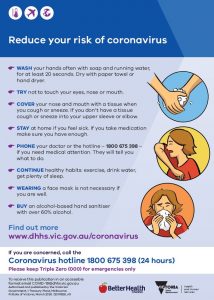
COVID-19 response – Advocate Update: June 29, 2020
In recent weeks I have been hearing from people about how their experience during the COVID-19 emergency is changing and their concerns about the longer-term impacts of isolation on themselves, their families and friends.
In my most recent report to the Health Minister and Chief Health Officer I have highlighted the concern around growing inequity and the need for governments and services to consider local solutions as we move forward.
I am grateful to people for taking the time to share with me their experiences and their insights. Your willingness to share your very personal experiences has enabled me to provide a detailed and compelling report on a regular basis which I know is appreciated by those who receive it.
What am I hearing.
Despite turning their classes into a ZOOM meeting, a local exercise group for older people has struggled to keep connected to its members. Organisers are seeing signs of people’s health deteriorating as a result of not being able to participate face to face in classes. They have observed an increase in falls and a decline in mental wellbeing for some participants. Group organisers have a desire to offer classes again and to help people become active again both mentally and physically and enjoy their exercise together.
Some older people have said that they are starting to feel institutionalised. Their confidence is diminishing as they continue to seek permission from their families more often than they used to. They are experiencing feelings of a loss of control and independence and there is increased demand for home care services.
Latrobe Regional Hospital has made efforts to engage with the community differently, utilising LinkedIn and newsletters. New community engagement is about to commence regarding the hospital expansion which will see the hospital use the Engage Victoria digital platform in a bid to access a broad range of communities across Latrobe.
Some people, who may already experience loneliness, have said they are used to living in isolation. However, the loss of the incidental connections they used to have has meant that they might not realise the negative effect that prolonged isolation is having on them.
Local families already experiencing financial stress have shared with me that they have recently had to go without some foods due to price increases of other services and items. There is an increasing risk that people already experiencing disadvantage will fall further behind as the COVID-19 emergency continues.
Innovations I am seeing.
Gippsland PHN is piloting a remote monitoring program. This digital health surveillance pilot was initially intended to occur at a smaller scale however due to COVID-19 the emphasis has shifted and now involves a number of respiratory clinics across Gippsland. The response from general practices has been largely positive indicating a greater openness to utilising more technologies into the future.
Recently I joined the staff from GippSport and the Latrobe Health Assembly in a virtual stretch and workplace wellbeing session. This ten minute, at the desk activity, is an innovation that has occurred to promote social connections and physical health between colleagues during the working day.
The Latrobe Health Assembly has released a video featuring Clinical Psychologist Dr Rob Gordon to engage with Latrobe communities about the emotions they may be experiencing during lockdown and as restrictions ease. <Include link> Dr. Gordon has extensive experience in supporting people who have experienced trauma in a range of circumstances. While the COVID-19 emergency isn’t as visible as a bush fire, the feelings of fear and anxiety are very similar, and Dr. Gordon’s advice explains how even the simplest changes can be a challenge for us to manage.
Greater utilisation of technology is seen as a way to provide greater access to services and remove barriers associated with transport, geography and cost. Currently, health services and policy makers are sharing consistent aspirations for telehealth or ‘virtual care’ to continue into the future.
There is increased public interest about the benefit of a more flexible response from Government that considers the differences between metropolitan and regional Victoria in relation to COVID-19 restrictions and community engagement. It is vital, however, that communities wherever they are, adhere to the rules and keep everyone safe.
I am sharing what I am hearing.
I am continuing to share my insights and suggestions with the Victorian Minister for Health and the Chief Health Officer and in my most recent update I have highlighted my interest in the following;
• How can older people be supported to reconnect, go back to exercise and continue to access health services as restrictions ease?
• Hospitals and health services have been significantly impacted by COVID-19. How can the Victorian Government further support Latrobe Regional Hospital and the Victorian Health and Human Services Building Authority to ensure there is a capacity and appropriate environment to continue to engage with communities and embrace various ways of doing this, even during the time of the pandemic?
• I note the localised response from DHHS in relation to recent COVID-19 outbreaks. What lessons can be learned from this experience and how might DHHS take a more proactive approach with other local communities in order to prevent and minimise future outbreaks before they occur?
I’m here to listen and to help our health system and governments to understand and respond to the needs of communities in Latrobe. The continued generosity of people in sharing their stories with me has given me the opportunity to provide advice that reflects what is happening across Victoria.
Please continue to share your suggestions and experiences with me by contacting me on 1800 319 255, email info@lhadvocate.vic.gov.au or follow us on Facebook @LHAdvocate and Twitter. For more information you can go to our website www.lhadvocate.vic.gov.au
As always, be kind, be patient and stay safe.
Latrobe Health Advocate